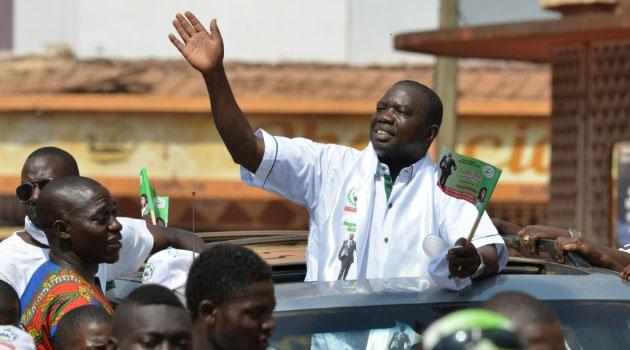
Central African Republic presidential candidate Agustin Agou waves at supporters during a campaign rally in Bangui on December 25, 2015 ahead of the country’s presidential election
© AFP
BANGUI, Central African Republic, Dec 26 – Long-delayed elections in volatile Central African Republic that are key to ending years of brutal sectarian unrest were postponed Friday for three days until December 30.
The postponement was due to problems sending ballot papers to voting centres outside the capital Bangui in time for an election this weekend — a reflection of the difficulties the poverty-stricken country faces in its bid to return to peace and normalcy.
“For technical reasons the first round of the presidential and legislative elections scheduled for Sunday 27 December 2015 is delayed until Wednesday December 30 2015,” the country’s National Election Authority (ANE) said Friday.
“This decision was taken after consultation with all those involved in the electoral process,” ANE said, adding that the aim is to “allow the electoral commission to accomplish its work in a calm and transparent manner.”
It added that the election campaign, with 30 candidates vying for president, has also been extended “to midnight Monday December 28”.
The authorities of the transition government had proposed on Thursday to delay the election to next week, because the ballot papers — which were printed in France — only reached Bangui on Thursday.
Normally the Consitutional Court would need to approve changing the voting date, but given the holiday period it does not plan to meet, a source close to the court said.
A decree from the country’s transitional President Catherine Samba Panza is expected soon to officially confirm the new election date.
– Desire for peace –
The long-awaited elections are aimed at turning the page on the sectarian conflict that erupted after a mainly Muslim rebellion overthrew longtime Christian president Francois Bozize in 2013.
The United Nations had said Thursday that delaying the vote would not be a setback and is justified by the country’s “very delicate security situation”.
Five people were killed and 20 others injured in an attack in the flashpoint majority-Muslim PK-5 district of Bangui during a key December 13-14 constitutional referendum that was seen as a test for the upcoming general election.
Hundreds of people marched to the UN peacekeeping headquarters in the aftermath of the attack, to demand the expulsion of the “enemies of peace” in PK-5 — a sign of a widespread desire to return to a life of peace.
Security has been tight in the lead-up to the election, after more than two years of fighting that forced 10 percent of the population to flee their homeland.
Yet despite the presence of 11,000 UN and French peacekeepers, large chunks of the country remain out of bounds, either under the control of rebel chieftains or bandits.
Pope Francis on November 30 paid a high-profile visit to Bangui and appealed to Muslims and Christians to live as “brothers and sisters”, while on the last leg of his three-nation tour of Africa.
The pope’s message of peace and reconciliation appeared to have made a powerful impression, with a group of Muslim rebels turning up to join tens of thousands at a papal mass in the capital’s Barthelemy Boganda stadium.









































